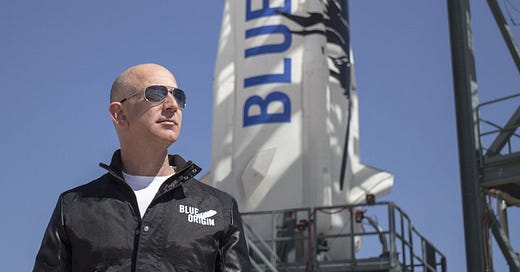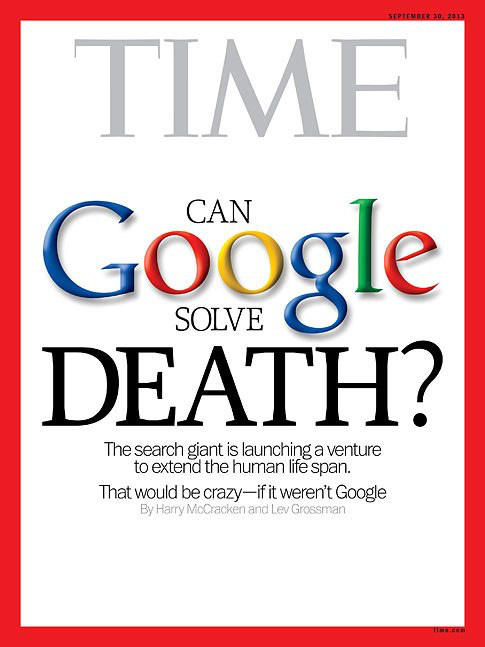Billionaire Goals: Live Forever, On Mars
Today’s billionaires regularly channel their wealth into traditional areas of philanthropy like education and public health. For example, Bill and Melinda Gates’ efforts include spending billions to eradicate polio and malaria, Warren Buffet has pledged to give 85% of his Berkshire Hathaway wealth to the Gates Foundation and other charities, and duty-free shopping magnate Charles Feeney’s giving includes almost a billion dollars of donations to his alma mater, Cornell University.
But the richest of the rich are also devoting significant resources to futuristic moonshots. Critics call it self-absorbed. Fans call it visionary. Two billionaire fixations have caught my attention: space travel and life extension. It’s the stuff of science fiction, which makes sense: the nouveau riche grew up inspired by the likes of Star Trek (Peter Thiel, Jeff Bezos)and The Hitchhiker’s Guide to the Galaxy (Elon Musk).
Critics call it self-absorbed. Fans call it visionary.
Last week, we witnessed the explosion of one of Elon Musk’s SpaceX rockets as it prepared to carry a $300 million satellite into orbit. It was a setback, but the fact that it even happened is a testament to how far the private space industry has come. And despite inevitable hiccups, private space pursuits are yielding clear results. Just last month, the Federal Aviation Administration for the first time gave approval to a private company, Moon Express, to land on the moon.
Billionaires like Musk are devoting huge amounts of time and resources to creating a viable private space industry. Collectively, Musk, Virgin’s Richard Branson, Amazon’s Jeff Bezos, and Microsoft’s Paul Allen have invested over a billion dollars of their own money into space ventures.
Billionaires like Musk are devoting huge amounts of time and resources to creating a viable private space industry.
SpaceX has been successfully running supply missions to the International Space Station, and Musk is expected to announce plans for a human mission to Mars later this month. Starting in 2018, Bezos-led Blue Origin will bring tourists—and, eventually, science experiments—to suborbital space. Branson’s company, Virgin Galactic, recently received authorization to restart flights to space after a tragic crash in 2014. And Paul Allen’s Stratolaunch Systems will send satellites into orbit using the biggest airplane in the world.
Extraterrestrial resource extraction has also caught the eye of starry-eyed billionaires. Google’s Larry Page and Eric Schmidt have invested in Planetary Resources, a company hoping to extract commodities from asteroids. Richard Branson is also an investor. Moon Express, a prospective moon miner, is competing for Google’s Lunar XPRIZE, a $20 million award given to the first team that can put a robot on the moon and transmit information back to Earth.
While some billionaires are focused on outer space, others are fixated on living forever—or, at least, extending human lifespans dramatically. Oracle’s Larry Ellison has devoted almost half a billion dollars to anti-aging initiatives. “Death makes me angry,” he says. “It doesn’t make any sense to me. Death has never made any sense to me. How can a person be there and then just vanish, just not be there?”
“Death has never made any sense to me” —Larry Ellison
PayPal co-founder Peter Thiel is another high-profile would-be death-defier. According to the New Yorker, Thiel too “sees death as a problem to be solved, and the sooner the better. Given the current state of medical research, he expects to live to a hundred and twenty—a sorry compromise, given the grand possibilities of life extension.” Thiel has invested in anti-aging technology, expressing interest in approaches like parabiosis—injecting young people’s blood as a means to longevity.
Meanwhile, Google co-founder Larry Page has long supported immortality research, and in 2013 he announced a life-extension startup called the California Life Company, or Calico, now part of Alphabet. I consider it a leading candidate to become the world’s hottest company within the next five years.
The other original Googler, Sergey Brin, co-founded the Breakthrough Prize in the Life Sciences, which “honors transformative advances toward understanding living systems and extending human life.” 23andMe’s Anne Wojcicki, Facebook’s Mark Zuckerberg, and Alibaba’s Jack Ma have joined Brin to support the prize.
And even more out-there, five years ago, Russian billionaire Dmitry Itskov founded the 2045 Initiative, an effort to upload consciousness into a machine to achieve immortality. Itskov’s vision looks forward to the “singularity,” a point in the future when technological progress accelerates dramatically, potentially enabling nearly unthinkable developments like eternal life. Google hired the concept’s biggest booster, Ray Kurzweil, and Page and Google have backedSingularity University, which Kurzweil co-founded.
While the lavish lifestyles of the rich and famous may capture our attention, it’s their ambitions that may ultimately affect us more profoundly. As science policy analyst Steven Edwards told the New York Times, “the practice of science in the 21st century is becoming shaped less by national priorities or by peer-review groups and more by the particular preferences of individuals with huge amounts of money.”
[Billionaires’] personal whims and visions are shaping the direction of scientific progress.
And so while many of us may not relate to billionaire lifestyles, let’s hope their ambitions overlap with society’s needs, because for better or worse, their personal whims and visions are shaping the direction of scientific progress.
Fortunately, regardless of the merits of their moonshots’ immediate goals, ambitious projects like space exploration and life extension are likely to provide invaluable spillover benefits. In the last century, geopolitical objectives stimulated funding for NASA and DARPA, whose research and development helped spur countless innovations, including solar panels and the Internet.
Might Calico crack the code for cancer as it seeks immortality? Or could findings from space research yield unlimited energy? It’s impossible to know, but fantastic moonshots like those being pursued today might just make breakthroughs like these happen.
Vikram Mansharamani is the President of Kelan Advisors, LLC and the author of Boombustology: Spotting Financial Bubbles Before They Burst(Wiley, 2011).To learn more about him or to subscribe to his free mailing list, visit his website. He can also be followed on Twitter @mansharamani or by liking his Facebook page.





